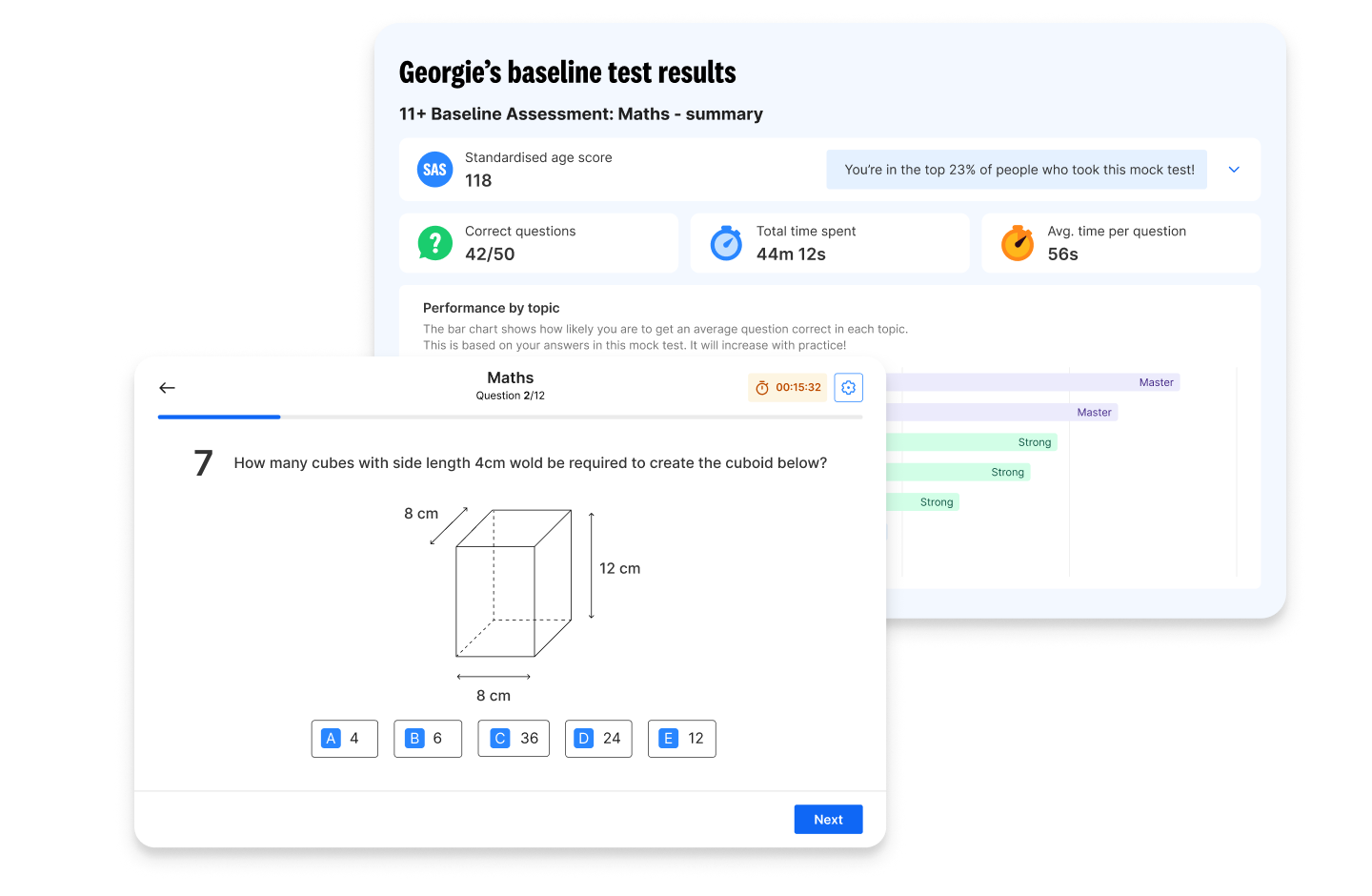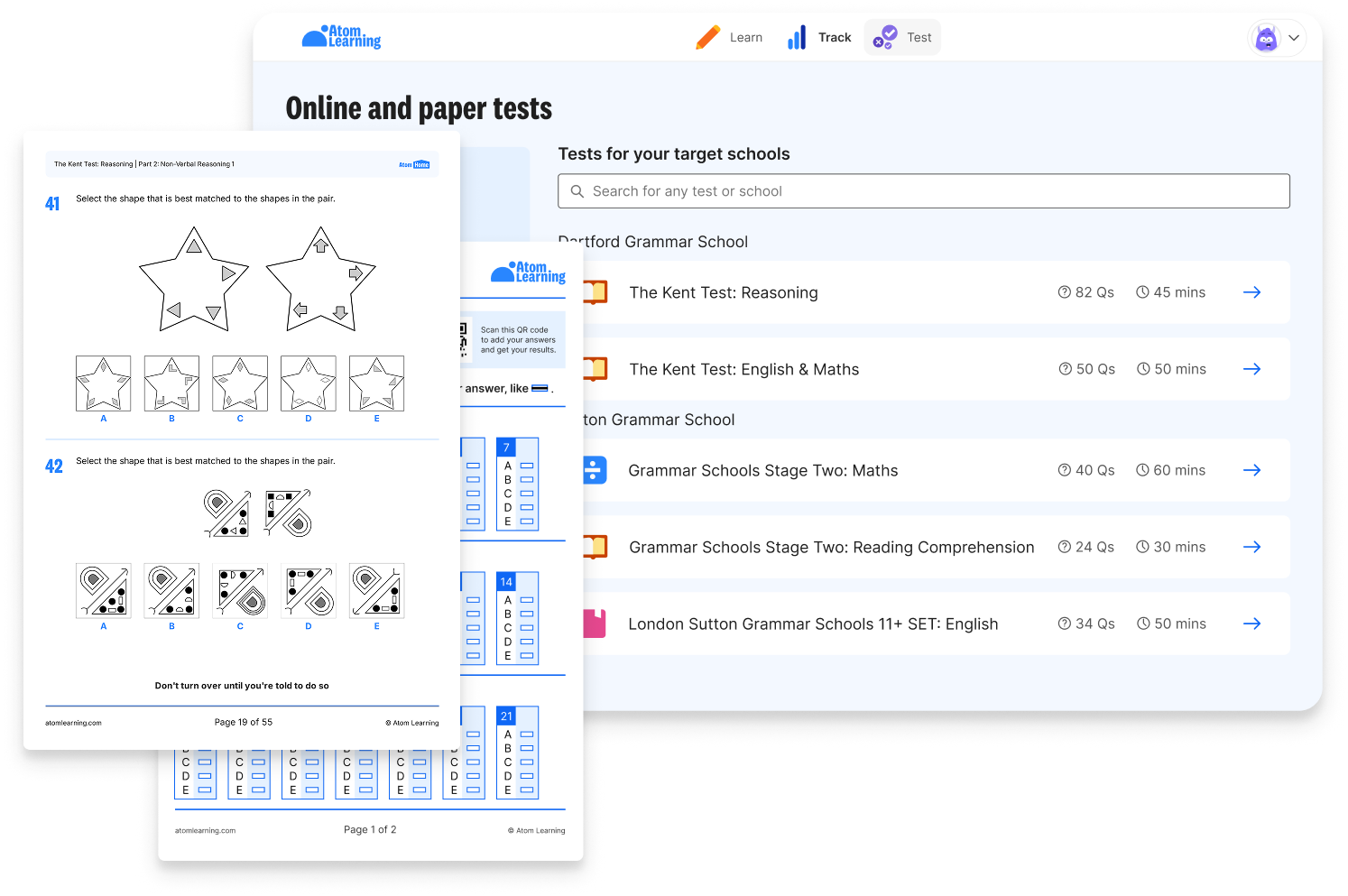11 plus exam techniques: 5 top tips

Every year, approximately 100,000 children aged 10-11 take the 11 plus exam, hoping to secure entry to a selective school (independent and grammar schools) for the following year.
The 11 plus usually consists of two or more papers which are designed to test each child's ability in the primary school syllabus and assess their academic potential. Children are normally tested in two or more of the following subjects (the exact test papers will vary among exam boards and between individual schools):
For many children, this is an entirely new experience and it may be the first time they have taken a timed test under exam conditions – so it's perfectly natural to feel nervous! If your child is sitting entrance exams this year, you may wish to share our top tips and exam techniques to help them feel confident on the big day.
Exam technique 1: check the test information
If your child is registered to take the 11 plus exam, the school or test centre will likely send you details about the structure of the exam day in advance.
Block out some time in your calendar to read through this information with your child, so that you both know what to expect on the day. The information may cover details such as:
- The time your child needs to be dropped off at the exam location, and the anticipated time the test will end
- The exam format (i.e. whether your child will be taking the test on a computer or on a question paper)
- The subjects your child will be tested on
- The time allowance for each test, and whether there will be a break between tests
- The exam room your child will be taking the test in
- Items that are allowed (normally basic stationery, a bottle of water and analogue watches)
- Items that are prohibited (such as calculators, smart watches and food containing nuts)
Is your child ready for the 11+?
See where they stand in minutes. Atom’s free 11+ baseline tests give you an instant breakdown of their strengths and gaps. Know exactly what to focus on next and start preparing with direction, not uncertainty.

Exam technique 2: read the questions carefully
It's very easy to rush in a time-pressured environment. If your child is nervous about completing the test in time, they may be tempted to 'skim read' the questions.
Firstly, your child should listen to the instructions given by the invigilator at the start of the exam, and read any instructions that are printed on the front of their question booklet (or on-screen, if taking the test online). They will be told whether to write all of their answers within the question booklet or if they will need to use a separate sheet to write their answers. Some exam boards, such as GL Assessment, provide children with a multiple choice answer sheet for 11 plus exams.
Read our article, How to fill in 11+ answer sheets correctly: a step-by-step guide for parents.
Secondly, encourage your child to read every question carefully as they work through the test. Skim reading questions can result in misinterpretation and the loss of marks for silly mistakes. For example, if there are multiple choice questions that require the candidate to select two options, but your child only chooses a single answer, they might not get any marks for the question – even if they were technically correct.
Top tip for kids: read every question twice and underline the key words in the instructions before you start on your answer. Pay extra attention to any instructions in capital letters!
Exam technique 3: keep an eye on the time
Time management is an essential exam technique for success in all exams – including the 11 plus. While some exams (especially those administered by GL Assessment and CEM) consist of individually timed sections, others may require children to complete a whole paper within 45 minutes to one hour.
Make sure your child knows the specific timing available for each paper in advance of the exam (you'll likely be supplied with this information by the school), and encourage them to check the clock frequently as they work through the test. Past papers are a great way to practice time management, as they give children an idea of how long they should be spending on each question.
Top tip for kids: the exam invigilator will let you know when the test will end – listen to this carefully. Once you're halfway through the time allowed, check to see how many questions you have left to complete. This should help you work out if you need to work more quickly, or if you have time to slow down!
Exam technique 4: if in doubt, make a guess
The 11 plus is, by design, a challenging exam. It’s normally used by schools to identify children who are working within the top 25% of their cohort (or the top 10% for some particularly competitive schools). This means that no matter where your child's strengths lie, there will still be questions that they struggle to answer.
It's important that your child doesn't waste time on questions too early in the exam. Working quickly yet accurately is key to success – so spending ages trying to work out answers can really hamper their progress. Encourage your child to get into the habit of moving on to the next question if they’re struggling.
Meanwhile, if the questions are in multiple-choice format, there's no harm in your child choosing any of the options available if they really don't know the correct answer. Any answer is better than none, as they'll still be in with a chance of getting it right and making up marks.
Top tip for kids: don't spend too long struggling on very tricky questions – make a mark next to the question to remind yourself and move on to the next one. If you have time left at the end of the test, you can have another go at the questions you left out. Wrong answers are better than no answers!
Exam technique 5: maintain your focus
Unless your child has specific special educational needs that have been disclosed to their target school in advance, it's highly likely that they will be taking the 11 plus exam in a room with lots of other candidates. Some children find this experience distracting, but learning how to focus in an exam room is a key skill that children will gradually develop throughout their secondary education.
It's important to remind your child to keep their eyes on their own question paper on the big day. Wanting to see what everybody else is doing is natural, but your child will need to fight this temptation. Candidates who repeatedly look as though they are trying to see what other children are writing may face penalties from invigilators.
Top tip for kids: try to shut out everybody else in the room and keep your head down as much as possible. The only things you should be focusing on are the clock and your own exam paper!
Take control of your child’s 11+ preparation.

Not sure if your child is on track for the grammar school 11+? You don’t need to guess what to cover or whether they’re ready. Atom shows you exactly what to practise each week and how they’re performing, so you can stay ahead of the process without the stress.
- Follow personalised weekly exam plans that show them what to learn next.
- Download replica 11+ practice papers and upload a photo for instant, stress-free marking.
- Track progress and see how they compare to others applying to the same schools.
Start your free trial and help your child feel fully prepared for the 11+.



